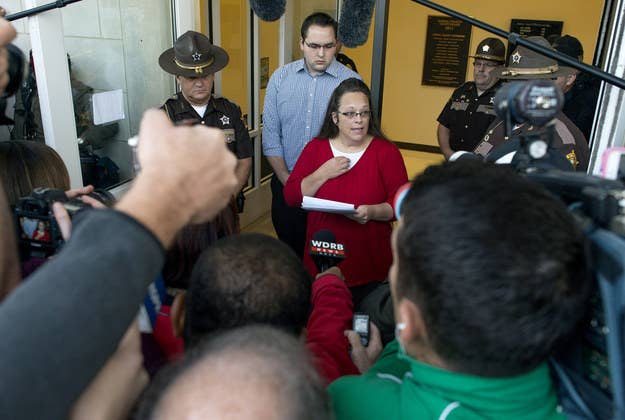
WASHINGTON — Although this week lacked the fireworks in Rowan County, Kentucky, that recent weeks have seen over the issuance of marriage licenses there, lawyers on Friday brought two issues to the trial judge in the case that could reignite the fight this coming week.
Rowan County Clerk Kim Davis, who was jailed over her refusal to issue marriage licenses when under court order to do so, was back at work on Sept. 14. While she continued to refuse to issue marriage licenses — and said that she wasn't herself authorizing them — Davis said that she would not stop deputy clerks who were issuing licenses from doing so.
Davis did, however, announce that the licenses would "state that they are issued pursuant to a federal order." When the first license was issued, additional changes from the licensed previously issued were reported by BuzzFeed News as well.
The lawyer for Deputy Clerk Brian Mason brought that issue to US. District Court Judge David Bunning's attention on Friday, noting that it "appears to this counsel those changes were made in some attempt to circumvent the court's orders and may have raised to the level of interference against the court's orders."
When Bunning released Davis from jail on his contempt order, he released her on the condition that she not interfere with the issuance of licenses.
In Friday's filing, Mason's lawyer added that his client's concern is that "he does not want to be the party that is issuing invalid marriage licenses." He also noted that Mason "is trying to follow the court's mandate, as well as his superior [Davis] ordering him to issue only these changed forms."
Since Bunning is the one who ordered Davis not to interfere with the issuance of licenses, he will have to make a decision as to whether her actions constitute interference. If Bunning decides that she has violated his order, she could be ordered to change the forms back, or face "appropriate sanctions," as Bunning said she would if she violated the order.
In addition to the license alteration question, a second issue was raised with Bunning on Friday — this one from the lawyers from the plaintiffs in the case.
The second issue relates to the question of who is covered by Bunning's injunction.
Initially, his order was that Davis not enforce her "no marriage licenses" policy as to the four couples who brought the lawsuit. On Sept. 3, however, Bunning — in response to a request from the plaintiffs — issued a "clarified" order, stating that Davis had to stop enforcing the policy against any couple seeking a marriage license.
In a request to the 6th Circuit Court of Appeals, Davis had asked for the Sept. 3 order to be put on hold, asserting that it was, more or less, an attempt by the plaintiffs to get around waiting on their request for the judge to expand the case into a class action lawsuit that would cover all couples.
Bunning had put the class action request on hold while the preliminary injunction appeal could be heard, but then, Davis's lawyers argued, he effectively took the same action as would have been achieved under the class action in the guise of "clarifying" his initial preliminary injunction.
On Thursday, the 6th Circuit rejected Davis's request, holding that she first had to seek a stay from Bunning under federal court rules. While technically sending Davis back to the trial court to seek the stay, which her lawyers did on Friday, the decision also gives Bunning a chance to figure out whether the clarified injunction is the best approach.
On Friday, the plaintiffs' lawyers attempted to give Bunning a way to resolve the issue by asking him to reopen and speed up consideration of the class action request.
In the most relevant section of the filing, the lawyers wrote:
"Plaintiffs believe that this Court's September 3 Order clarifying the preliminary injunction was procedurally and jurisdictionally proper. However, in light of (1) the arguments presented by Defendants to the Sixth Circuit and this Court regarding the current lack of class certification and this Court's stay of class certification proceedings, and (2) Davis' conduct making clear that she only continues to issue the licenses to all couples because of this Court's Order, the principles of equity dictate that this Court should reopen and expedite briefing on the class certification motion to ensure that members of the putative class are protected from the serious and irreparable harm that Davis seeks to impose on them."
In other words, the plaintiffs' lawyers say that, while they believe the Sept. 3 clarified order is fine, Bunning could avoid the questions raised by Davis by certifying a class and making the case a class action lawsuit that would formally include all couples wishing to marry in Rowan County as plaintiffs.
Both of these issues are now before Bunning, who has had some difficulties keeping his rulings clear in the case.
